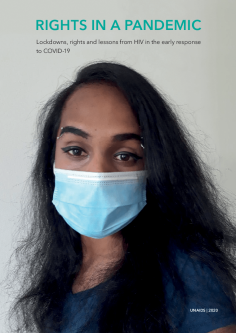As governments across the globe responded to the COVID-19 pandemic, they often violated human rights and failed to protect their most vulnerable citizens. To address these challenges, the United Nations AIDS program released a report that details these violations and outlines 10 areas in which leaders can build successful rights-based responses.
Titled Rights in a Pandemic: Lockdowns, Rights and Lessons From HIV in the Early Response to COVID-19, the report looks at the first months of the pandemic—February to mid-May—and details increases of gender-based violence, instances when COVID-19 served as a cover for raising prices and limiting the movement of individuals and instances of people being arrested for not wearing masks and of police using rubber bullets and tear gas to enforce physical distancing, to list but a few examples.

The cover of “Rights in a Pandemic” features Twinkle Paule, a transgender activist who migrated from Guyana to the United States of America two years ago.Courtesy of UNAIDS
Published by the Joint United Nations Programme on HIV/AIDS (UNAIDS), the report is available free online and continues the dialogue begun with Rights in the Time of COVID-19, a report UNAIDS released in March. As the authors of Rights in a Pandemic state in the report’s foreword: “We are learning more about COVID-19 and about the response day by day. Learning and adapting is central to success. We invite and look forward to ongoing conversations with governments and other stakeholders to exchange experiences, strengthen plans and continue to learn about how we can best support countries in our joint work.”
The report explores 10 ways in which governments can respond to the pandemic without violating human rights. These include areas of law enforcement, access to services and participation in the rule of law. The 10 areas are:
- Avoid disproportionate, discriminatory or excessive use of criminal law
- Stop discriminatory enforcement against key populations
- Explicitly prohibit state-based violence, and hold law enforcement and security forces accountable for disproportionate responses or actions when enforcing COVID-19 response measures
- Include reasonable exceptions to ensure legal restrictions on movement do not prevent access to food, health care, shelter or other basic needs
- Take proactive measures to ensure people, particularly from vulnerable groups, can access HIV treatment and prevention services and meet other basic needs
- Rapidly reduce overcrowding in detention settings and take all steps necessary to minimize COVID-19 risk, and ensure access to health and sanitation, for people deprived of liberty
- Implement measures to prevent and address gender-based violence against women, children and lesbian, gay, bisexual, transgender and intersex people during lockdowns
- Designate and support essential workers, including community health workers and community-led service providers, journalists and lawyers
- Ensure limitations on movement are specific, time-bound and evidence-based, and that governments adjust measures in response to new evidence and as problems arise
- Create space for independent civil society and judicial accountability, ensuring continuity despite limitations.
“It is a myth that there can be a trade-off between human rights and public health,” said Winnie Byanyima, executive director of UNAIDS, in a press release for the new report. “Human rights are not only intrinsic, but they are also the very means by which governments can successfully beat a pandemic.”
“This report is coming at a critical time,” added Felicita Hikuam, director of the AIDS and Rights Alliance for Southern Africa. “Sadly, it seems that we have not learned the lesson HIV has tried to teach us: Epidemics expose and exacerbate existing inequities and impact most negatively on those who are already marginalized.”
In related news, see the POZ article “COVID-19 Criminalization: Seven Lessons from the HIV Response.”







Comments
Comments